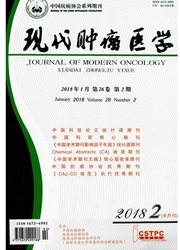

 中文摘要:
中文摘要:
目的:探索姜黄素对肝癌HepG2细胞系增殖、侵袭能力的影响及其可能机制。方法:用不同浓度的姜黄素处理人肝癌HepG2细胞,MTT法检测细胞增殖,采用Transwell实验检测细胞的侵袭能力。分别提取细胞总mRNA及总蛋白,运用实时定量PCR(qRT-PCR)及Western blotting方法来检测姜黄素对HepG2细胞侵袭相关分子(MMP-2及MMP-9)及COX-2表达影响。结果:不同剂量的姜黄素均可以抑制肝癌HepG2细胞的增殖活性,与对照组相比差异显著(P〈0.05);随着姜黄素浓度的增加,HepG2细胞的侵袭能力逐渐降低;姜黄素可以从mRNA及蛋白水平下调侵袭相关分子MMP-2、MMP-9的表达;姜黄素可以下调COX-2的mRNA及蛋白表达水平,与对照组相比差异有统计学意义。结论:姜黄素可以抑制肝癌HepG2细胞的增殖及侵袭能力,该作用可能与下调侵袭相关分子及COX-2的表达有关。
 英文摘要:
英文摘要:
Objective: To investigate the effects of curcumin on the proliferation and invasion of hepatocellular carcinoma HepG2 cells and the potential mechanism. Methods: The human hepatocellular carcinoma HepG2 cell was treated with curcumin at different concentration. Cell proliferation rate was measured by MTT method. Cell invasion ability was detected by Transwell assay. Total cell mRNA and protein were prepared and subjectd to real-time PCR( qRT-PCR) and Western blotting to detect the effects of curcumin on the expression of invasion-related molecular( MMP-2 and MMP-9) in HepG2 cells. Results: Curcumin at different concentration showed inhibitory effect on hepatocellular carcinoma HepG2 cell proliferation,and the differences were significant compared with the control( P 0. 05). The invasion ability of HepG2 cell was gradually reduced with the increase of the curcumin concentration. Curcumin intervention inhibited the expression of MMP-2 and MMP-9 both at mRNA and protein levels. Furthermore,the mRNA and protein expression of COX-2 were downregulated by curcumin,and the differences were significant compared with the control( P 0. 05). Conclusion: Curcumin can inhibit the proliferation and invasion of hepatocellular carcinoma,and this may be associated with the reduced expression of invasion-related molecular and COX-2.
 同期刊论文项目
同期刊论文项目
 同项目期刊论文
同项目期刊论文
 Impact of Cigarette Smoking on Outcome of Hepatocellular Carcinoma after Surgery in Patients with He
Impact of Cigarette Smoking on Outcome of Hepatocellular Carcinoma after Surgery in Patients with He Overexpression of syntenin enhances hepatoma cell proliferation and invasion: Potential roles in hum
Overexpression of syntenin enhances hepatoma cell proliferation and invasion: Potential roles in hum Overexpression of platelet-derived growth factor receptor alpha promotes tumor progression and indic
Overexpression of platelet-derived growth factor receptor alpha promotes tumor progression and indic Risk factors and clinical characteristics of portal vein thrombosis after splenectomy in patients wi
Risk factors and clinical characteristics of portal vein thrombosis after splenectomy in patients wi 期刊信息
期刊信息
